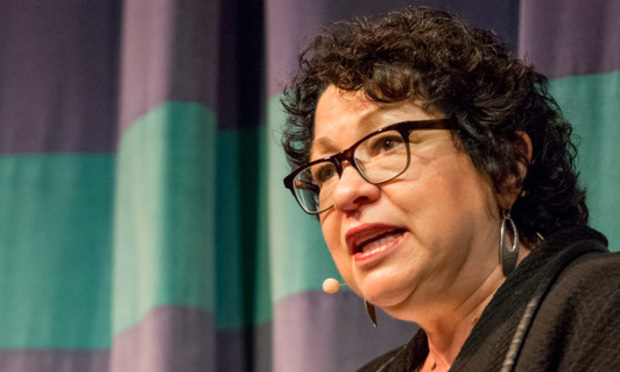Pardon Her French: Sotomayor Voices Frustration With Her Colleagues
Sotomayor's dissents on Monday fit her longtime practice of speaking out in cases in which defendants, in her view, are given short shrift.
April 02, 2018 at 01:18 PM
4 minute read
 Justice Sonia Sotomayor. Credit: Jason Doiy/ ALM
Justice Sonia Sotomayor. Credit: Jason Doiy/ ALM U.S. Supreme Court Justice Sonia Sotomayor on Monday resorted to the words of a French author to express her displeasure with the high court's repeated refusal to take up death penalty cases from Florida.
“Toutes choses sont dites déjà; mais comme personne n'écoute, il faut toujours recommencer,” she wrote in a footnote in her dissent from the denial of certiorari in Cozzie v. Florida. The English translation of the 1892 maxim by French writer Andre Gide is: “Everything has been said already; but as no one listens, we must always begin again.” (Sotomayor included the translation.)
In a separate unsigned opinion Monday in Kisela v. Hughes, Sotomayor wrote another dissent expressing similar frustration—though not in French—with the court's penchant for summarily granting police qualified immunity in civil rights cases, without full briefing and oral argument. The court's opinion ran eight pages and Sotomayor's dissent was 15 pages long.
“As I have previously noted,” Sotomayor wrote, “this court routinely displays an unflinching willingness to summarily reverse courts for wrongly denying officers the protection of qualified immunity but rarely intervenes where courts wrongly afford officers the benefit of qualified immunity in these same cases.”
Justice Ruth Bader Ginsburg joined Sotomayor's dissent in the qualified immunity case, but in the capital punishment case, Sotomayor was alone.
Sotomayor's Monday dissents fit her longtime practice of speaking out in cases in which defendants, in her view, are given short shrift. In her 2014 book about Sotomayor, author Joan Biskupic wrote about the justice's “concern for criminal law procedures. Sometimes her liberal colleagues would be with her, but often she was alone.”
In the Cozzie case on Monday, Sotomayor noted that twice before, the court had turned away capital case appeals from decisions by the Florida Supreme Court “in cases where that court failed to address a substantial Eighth Amendment challenge to capital defendants' sentences.” She said the Florida court was not adequately taking into account her 2015 decision in Hurst v. Florida invalidating aspects of Florida's death penalty scheme.
As for the Kisela case, Sotomayor recited the facts of a 2010 episode in which a Tucson, Arizona, police officer shot and wounded a woman who was carrying a kitchen knife. By summarily siding with the police officer, she said, the court “misapprehends the facts and misapplies the law, effectively treating qualified immunity as an absolute shield.”
The high court's actions, she added, “sends an alarming signal to law enforcement officers and the public. It tells officers that they can shoot first and think later, and it tells the public that palpably unreasonable conduct will go unpunished.”
University of Chicago Law School professor William Baude, whose article about the court's qualified immunity cases was cited by Sotomayor, said Monday that Sotomayor was right in asserting that “even if qualified immunity is settled doctrine, that doesn't mean the court has to summarily reverse every fact-bound case that finds a police officer liable.”
Read more:
'With Respect,' Justice Breyer Blasts Immigration Ruling in Rare Oral Dissent
'You Can't Fight the Facts': Sotomayor Makes Case for Pay Equality
Clarence Thomas, in Dissent, Asserts Gun Rights Aren't 'Favored' at High Court
Of Course! SCOTUS Appears Split Over How to Handle Split Decisions
Supreme Court Justices Disagree—on These Three Writing Tools
This content has been archived. It is available through our partners, LexisNexis® and Bloomberg Law.
To view this content, please continue to their sites.
Not a Lexis Subscriber?
Subscribe Now
Not a Bloomberg Law Subscriber?
Subscribe Now
NOT FOR REPRINT
© 2025 ALM Global, LLC, All Rights Reserved. Request academic re-use from www.copyright.com. All other uses, submit a request to [email protected]. For more information visit Asset & Logo Licensing.
You Might Like
View AllShaq Signs $11 Million Settlement to Resolve Astrals Investor Claims
5 minute read
Am Law 100 Partners on Trump’s Short List to Replace Gensler as SEC Chair
4 minute read

Trending Stories
- 1Gunderson Dettmer Opens Atlanta Office With 3 Partners From Morris Manning
- 2Decision of the Day: Court Holds Accident with Post Driver Was 'Bizarre Occurrence,' Dismisses Action Brought Under Labor Law §240
- 3Judge Recommends Disbarment for Attorney Who Plotted to Hack Judge's Email, Phone
- 4Two Wilkinson Stekloff Associates Among Victims of DC Plane Crash
- 5Two More Victims Alleged in New Sean Combs Sex Trafficking Indictment
Who Got The Work
J. Brugh Lower of Gibbons has entered an appearance for industrial equipment supplier Devco Corporation in a pending trademark infringement lawsuit. The suit, accusing the defendant of selling knock-off Graco products, was filed Dec. 18 in New Jersey District Court by Rivkin Radler on behalf of Graco Inc. and Graco Minnesota. The case, assigned to U.S. District Judge Zahid N. Quraishi, is 3:24-cv-11294, Graco Inc. et al v. Devco Corporation.
Who Got The Work
Rebecca Maller-Stein and Kent A. Yalowitz of Arnold & Porter Kaye Scholer have entered their appearances for Hanaco Venture Capital and its executives, Lior Prosor and David Frankel, in a pending securities lawsuit. The action, filed on Dec. 24 in New York Southern District Court by Zell, Aron & Co. on behalf of Goldeneye Advisors, accuses the defendants of negligently and fraudulently managing the plaintiff's $1 million investment. The case, assigned to U.S. District Judge Vernon S. Broderick, is 1:24-cv-09918, Goldeneye Advisors, LLC v. Hanaco Venture Capital, Ltd. et al.
Who Got The Work
Attorneys from A&O Shearman has stepped in as defense counsel for Toronto-Dominion Bank and other defendants in a pending securities class action. The suit, filed Dec. 11 in New York Southern District Court by Bleichmar Fonti & Auld, accuses the defendants of concealing the bank's 'pervasive' deficiencies in regards to its compliance with the Bank Secrecy Act and the quality of its anti-money laundering controls. The case, assigned to U.S. District Judge Arun Subramanian, is 1:24-cv-09445, Gonzalez v. The Toronto-Dominion Bank et al.
Who Got The Work
Crown Castle International, a Pennsylvania company providing shared communications infrastructure, has turned to Luke D. Wolf of Gordon Rees Scully Mansukhani to fend off a pending breach-of-contract lawsuit. The court action, filed Nov. 25 in Michigan Eastern District Court by Hooper Hathaway PC on behalf of The Town Residences LLC, accuses Crown Castle of failing to transfer approximately $30,000 in utility payments from T-Mobile in breach of a roof-top lease and assignment agreement. The case, assigned to U.S. District Judge Susan K. Declercq, is 2:24-cv-13131, The Town Residences LLC v. T-Mobile US, Inc. et al.
Who Got The Work
Wilfred P. Coronato and Daniel M. Schwartz of McCarter & English have stepped in as defense counsel to Electrolux Home Products Inc. in a pending product liability lawsuit. The court action, filed Nov. 26 in New York Eastern District Court by Poulos Lopiccolo PC and Nagel Rice LLP on behalf of David Stern, alleges that the defendant's refrigerators’ drawers and shelving repeatedly break and fall apart within months after purchase. The case, assigned to U.S. District Judge Joan M. Azrack, is 2:24-cv-08204, Stern v. Electrolux Home Products, Inc.
Featured Firms
Law Offices of Gary Martin Hays & Associates, P.C.
(470) 294-1674
Law Offices of Mark E. Salomone
(857) 444-6468
Smith & Hassler
(713) 739-1250








